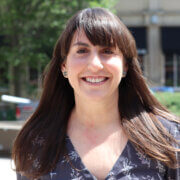Giving: A Passover Tradition

Passover 2022 begins at sundown on April 15 and ends the evening of April 23. Center photo: A table set for Seder.
“Whoever is hungry, come and eat;
whoever is needy, come and celebrate Passover.” – Haggadah
In the Jewish community, we treasure our numerous holidays. As I told my Christian husband when we met, there are at least a dozen Jewish holidays he will encounter.
But only three will get him in trouble if he doesn’t take off of work at least two hours early to help me cook – Rosh Hashanah (New Year), Yom Kippur, and Passover.
Of those, Rosh Hashanah lasts two and half days. And Yom Kippur isn’t really a celebration, as it requires Jews to atone for their sins. That’s why my favorite Jewish holiday, by far, is Passover. I especially love its connection to acts of generosity.
What does Passover celebrate in Judaism?
Passover, which occurs annually in either March or April, is a time when Jews and others remember the end of slavery for Israelites at the hand of the Egyptians.
The Seder is a ritual feast that marks the beginning of Passover. It is observed on the first night of the holiday. The Seder is not just about dining with family and friends, however. It involves retelling the story of the liberation of the Israelites in ancient Egypt.
And before any eating begins, the Seder involves scripted activities and readings. For example, part of the tradition involves kids fighting over an oversized cracker. The afikomen is usually the part of Passover that kids look forward to the most.
The afikomen is the half-piece of matzo, or unleavened bread, which is broken in two during the initial stages of the Seder. It is then set aside, or hidden in the house, to be eaten as a dessert after the kids find it.
Gathering for the Seder
Each part of the Passover ritual has meaning. For starters, the Seder should start on time. At a Christmas party, for example, if the invitation says the festivities begin at 7 p.m., you may feel comfortable showing up at 8:30 p.m. or so with a bottle of wine, and it’ll be fine.
But that doesn’t work for Passover. If the Seder is supposed to start at 7 p.m., you should never arrive later than 7:15 p.m. or so. Why? Because the guests will be hungry, and the actual meal won’t start for quite some time.
Once everyone arrives, guests and gracious hosts sit down and start reading from the Haggadah, the book that tells the history of Jewish people and how we got to this day. It’s a Jewish text that sets forth the order of the Passover Seder.
Every Jewish family worth its Kosher salt has versions of this reading material in multiple formats. The Haggadah may have remained in a desk drawer since last year’s Passover Seder, but it had nonetheless been carried down for generations, and sometimes across centuries.
Giving involves welcoming everyone
I remember my husband’s first Passover. He was the only Christian at a table of 20. He sat next to a family friend who was trying to help him follow along in the Haggadah, which, thankfully, also has pictures.
The friend says, “Don’t worry. Here’s the part where they try to kill us. This goes on for centuries.” That’s not funny… but it is funny! And that says a lot about Jewish people.
We can make fun of ourselves and our endless holidays. We can poke fun at some of our traditions, but mostly, we welcome everybody to be a part of Passover if possible, regardless of religion — and whether you like to read before eating!
A few years ago, we found out that my husband’s friend, who’s Jewish, hadn’t been to a Passover in more than a decade because nobody invited him and his wife, who is Christian.
We invited the couple and their three kids to our house for Passover. He was so appreciative that his children were able to experience what Passover is all about.
That experience always reminds me of a passage in the Haggadah that says, “Whoever is hungry, come and eat; whoever is needy, come and celebrate Passover.”
When it comes to Passover, it also doesn’t matter who speaks Hebrew or who doesn’t, or who’s at the table who might not even be Jewish, or even how young or old you are. It is a celebration.
Passover and giving
While Jews always have an obligation to give, kindness and generosity are elevated during Passover. There is an ancient custom called kimcha d’pischa, which means “flour for Pesach” or “kosher for Passover flour.”
This refers to giving charity before Passover to your city’s poor, so they will be able to afford all their Passover needs.
If you walk around the streets of Jerusalem during the Passover season, you will see trucks unloading fruits, vegetables, chickens, and meat for families that can’t afford the costs of the holiday.
To illustrate the need to give charity before the holiday, here’s a story about Rabbi Yosef Dov Soloveitchik, a 19th century Jewish author:
A woman approached him with a strange question. She wanted to know if one could use milk instead of wine for the four cups of the Seder. She explained that she could not afford wine. He answered her by giving her a large amount of money.
Asked the rabbi’s wife, “I understand you gave her money because she can’t afford the wine, but why so much?”
The rabbi answered, “If she wants to drink milk at the Seder, it is obvious she has no meat for Pesach (Passover) (as it is prohibited to eat meat and milk at the same meal). So, I gave her enough to buy wine and meat for the entire holiday.”
But as we all know, while we tend to focus on charitable giving around holidays, almost everyone remembers the poor around at that time. There are other weeks in the year when those who are in need among us have little or no food, and they are forgotten.
We should remember to do more good throughout the rest of the year as well.



